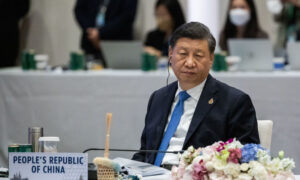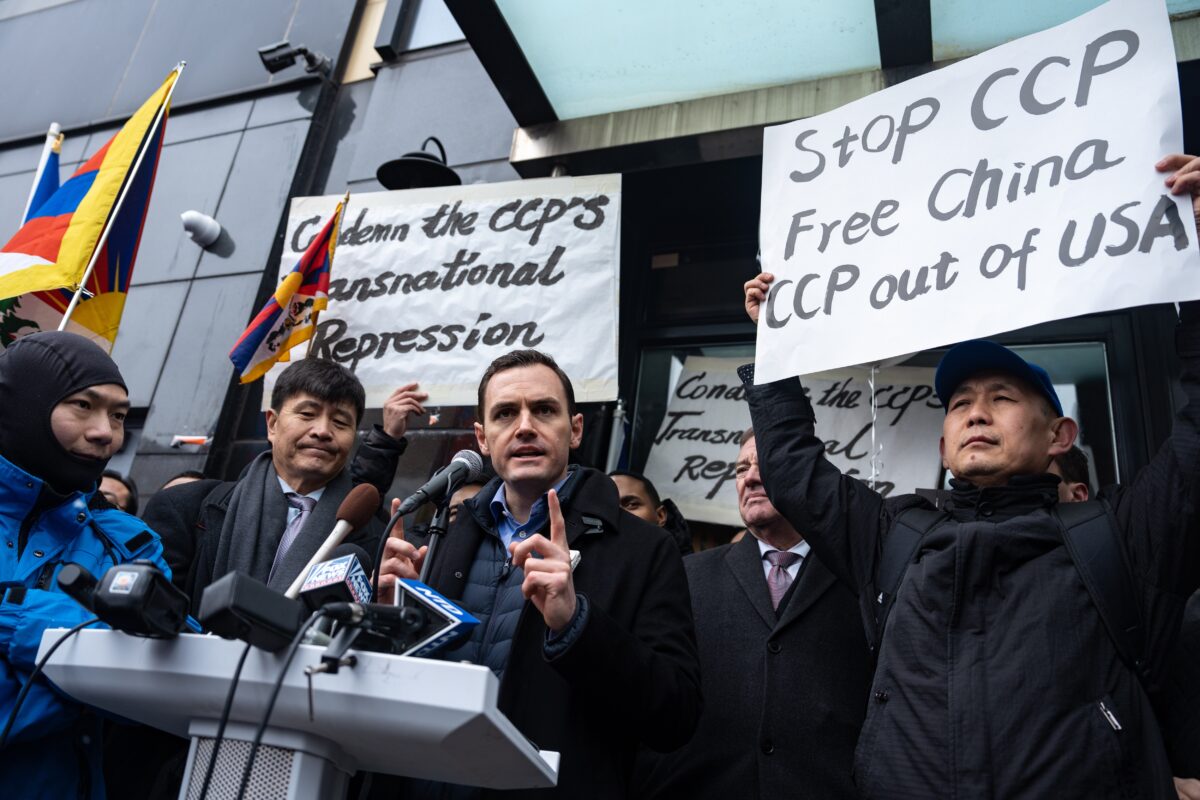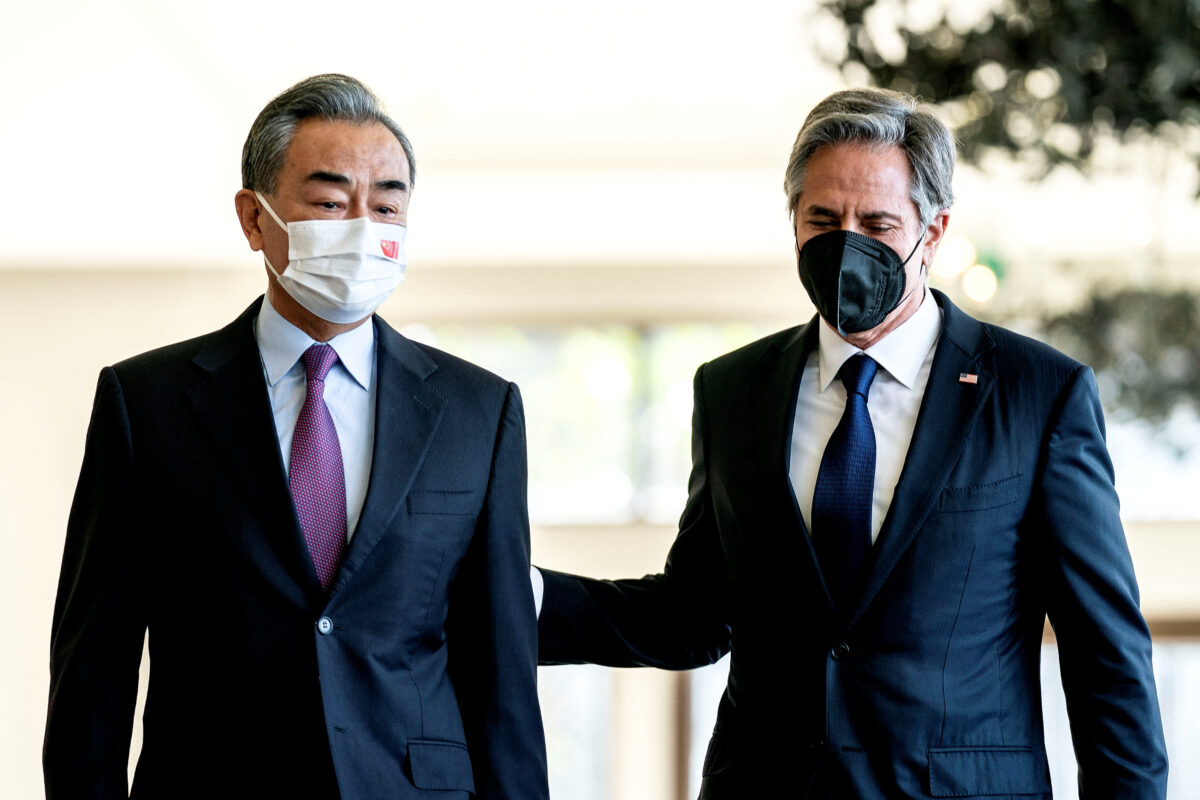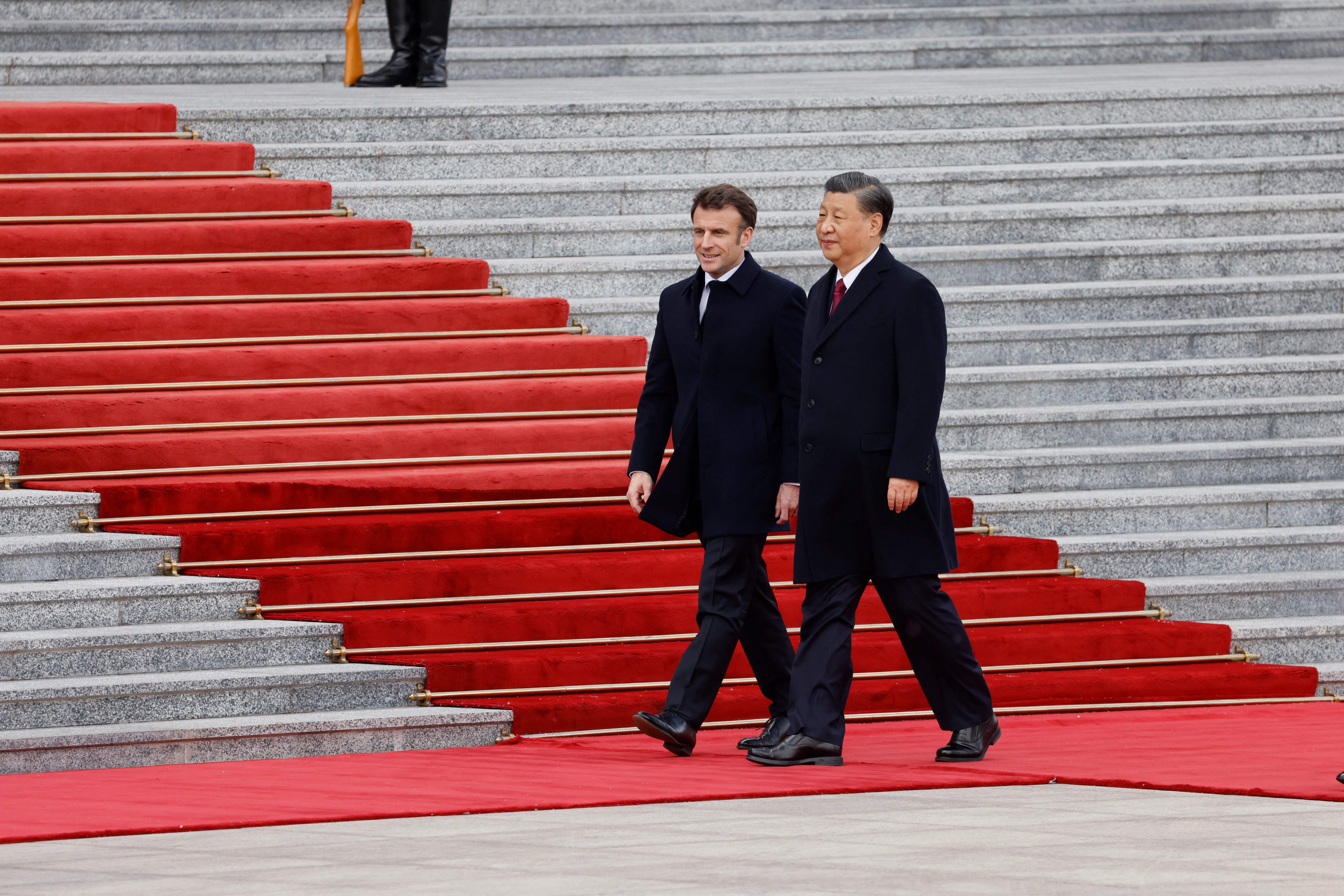IN-DEPTH: The CCP Fears US Containment—Is This What Washington is Doing?
When Rep. Mike Gallagher defended his title of “fastest man in Congress” for the sixth straight year in May, he wasn’t exactly in a celebratory mood. Winning the 3-mile race with a respectable 20 minutes 3 seconds, the Wisconsin congressman found himself turning his mind to post-Cold War America. “On paper, this was a victory. In reality, my time was slow,” he said in a statement after topping the congressional men’s division in the annual race for government and media staff in Washington. “Like America after the fall of the Berlin Wall, like Senator Tom Cotton after the 2016 [race], victory is defeating me,” the 39-year-old lawmaker said, referring to the defending champion he unseated in his maiden run in 2017. “Let this be a lesson to all past-their-prime politicians raging against the dying of the light: complacency kills.” Rep. Mike Gallagher (R-Wis.) speaks at a press conference and rally in front of the America ChangLe Association highlighting Beijing’s transnational repression, in New York City on Feb. 25, 2023. A now-closed overseas Chinese police station is located inside the association building. (Samira Bouaou/The Epoch Times) Months earlier, the fourth-term congressman, a former Marine Corps intelligence officer, took the job to lead the newly-created House Select Committee on the Chinese Communist Party (CCP). Gallagher’s comment after the win showed his immersion in this new undertaking. “He thinks we are in the window of maximum danger, and he’s doing everything he can to move the ball forward,” a source close to the Committee told The Epoch Times. Countering the Chinese regime is one of the few areas drawing bipartisan support on the Hill. Despite differing views on how exactly to characterize the challenge-such as, whether Beijing poses an “existential threat” or is merely a “strategic competitor”, the committee is “very bipartisan,” said the source. For one, deterring China from invading Taiwan is a central priority for the members sitting on over 15 other committees in Congress, she said. The U.S.-China economic relationship is another area of bipartisan focus, whether some call it “decoupling” and others “de-risking.” She listed specific action items, including achieving U.S. supply chain independence, ensuring American companies and investors are not implicated in the regime’s human rights abuses, and informing them of the risks of doing business in China. While Democrats may use a different vernacular to address the China challenge, there appears to be a growing convergence around the idea that strong action must be taken. “I don’t use the Cold War language, but we do know we are headed towards a confrontation,” said Rep. Ami Bera (D-Calif.), ranking member of the House Foreign Affairs’ Indo-Pacific Subcommittee, at a May hearing on China’s economic aggressions. ‘Zombie Engagement’ But some worry that this message is not getting through to the White House. On May 21, President Joe Biden said during the G-7 summit in Hiroshima, Japan, that a “thaw” was coming in U.S.-China relations “very shortly.” The White House has sought to restore regular dialogue with Beijing months after a Chinese spy balloon flew over U.S. airspace, prompting Secretary of State Antony Blinken to cancel his scheduled trip to China in early February. U.S. Secretary of State Antony Blinken meets Chinese Foreign Minister Wang Yi during a meeting in Nusa Dua, Bali, Indonesia, on July 9, 2022. (Stefani Reynolds/Pool via Reuters) On May 11, U.S. National Security Adviser Jake Sullivan told top Chinese diplomat Wang Yi in Vienna, Austria, that the Biden administration was “looking to move beyond” the tensions the spy balloon spurred. The balloon flew over sensitive military bases in America before the U.S. Navy shot it down on Feb. 6. “The president views our relationship with China as a strategic competition. He also believes that the United States is in a great position to succeed in that competition,” White House National Security Council spokesperson John Kirby told The Epoch Times in early May. “We’re not looking for conflict with China, and we want to keep the lines of communication open.” The Biden administration has also sought to establish guardrails around U.S.-China relations. The Chinese Foreign Minister, at a March press briefing, fiercely rejected competition as “malicious confrontation” and guardrails as bullying. For weeks, the United States has been pursuing another meeting between Biden and Xi Jinping, general secretary of the Chinese Communist Party (CCP), a proposal the CCP has resisted. Such dialogues are precisely what David Stilwell, former Assistant Secretary of State for East Asian and Pacific Affairs, advises against. In his view, the goal of this engagement is to ask the CCP’s permission to do things. By dangling the promise of dialogue, the regime hopes to distract the United States with “the relationship,” rather than allowing Washington to focus on actions. “So I

When Rep. Mike Gallagher defended his title of “fastest man in Congress” for the sixth straight year in May, he wasn’t exactly in a celebratory mood.
Winning the 3-mile race with a respectable 20 minutes 3 seconds, the Wisconsin congressman found himself turning his mind to post-Cold War America.
“On paper, this was a victory. In reality, my time was slow,” he said in a statement after topping the congressional men’s division in the annual race for government and media staff in Washington.
“Like America after the fall of the Berlin Wall, like Senator Tom Cotton after the 2016 [race], victory is defeating me,” the 39-year-old lawmaker said, referring to the defending champion he unseated in his maiden run in 2017.
“Let this be a lesson to all past-their-prime politicians raging against the dying of the light: complacency kills.”
 Rep. Mike Gallagher (R-Wis.) speaks at a press conference and rally in front of the America ChangLe Association highlighting Beijing’s transnational repression, in New York City on Feb. 25, 2023. A now-closed overseas Chinese police station is located inside the association building. (Samira Bouaou/The Epoch Times)
Rep. Mike Gallagher (R-Wis.) speaks at a press conference and rally in front of the America ChangLe Association highlighting Beijing’s transnational repression, in New York City on Feb. 25, 2023. A now-closed overseas Chinese police station is located inside the association building. (Samira Bouaou/The Epoch Times)
Months earlier, the fourth-term congressman, a former Marine Corps intelligence officer, took the job to lead the newly-created House Select Committee on the Chinese Communist Party (CCP).
Gallagher’s comment after the win showed his immersion in this new undertaking.
“He thinks we are in the window of maximum danger, and he’s doing everything he can to move the ball forward,” a source close to the Committee told The Epoch Times.
Countering the Chinese regime is one of the few areas drawing bipartisan support on the Hill. Despite differing views on how exactly to characterize the challenge-such as, whether Beijing poses an “existential threat” or is merely a “strategic competitor”, the committee is “very bipartisan,” said the source.
For one, deterring China from invading Taiwan is a central priority for the members sitting on over 15 other committees in Congress, she said.
The U.S.-China economic relationship is another area of bipartisan focus, whether some call it “decoupling” and others “de-risking.” She listed specific action items, including achieving U.S. supply chain independence, ensuring American companies and investors are not implicated in the regime’s human rights abuses, and informing them of the risks of doing business in China.
While Democrats may use a different vernacular to address the China challenge, there appears to be a growing convergence around the idea that strong action must be taken.
“I don’t use the Cold War language, but we do know we are headed towards a confrontation,” said Rep. Ami Bera (D-Calif.), ranking member of the House Foreign Affairs’ Indo-Pacific Subcommittee, at a May hearing on China’s economic aggressions.
‘Zombie Engagement’
But some worry that this message is not getting through to the White House.
On May 21, President Joe Biden said during the G-7 summit in Hiroshima, Japan, that a “thaw” was coming in U.S.-China relations “very shortly.”
The White House has sought to restore regular dialogue with Beijing months after a Chinese spy balloon flew over U.S. airspace, prompting Secretary of State Antony Blinken to cancel his scheduled trip to China in early February.

On May 11, U.S. National Security Adviser Jake Sullivan told top Chinese diplomat Wang Yi in Vienna, Austria, that the Biden administration was “looking to move beyond” the tensions the spy balloon spurred. The balloon flew over sensitive military bases in America before the U.S. Navy shot it down on Feb. 6.
“The president views our relationship with China as a strategic competition. He also believes that the United States is in a great position to succeed in that competition,” White House National Security Council spokesperson John Kirby told The Epoch Times in early May. “We’re not looking for conflict with China, and we want to keep the lines of communication open.”
The Biden administration has also sought to establish guardrails around U.S.-China relations. The Chinese Foreign Minister, at a March press briefing, fiercely rejected competition as “malicious confrontation” and guardrails as bullying.
For weeks, the United States has been pursuing another meeting between Biden and Xi Jinping, general secretary of the Chinese Communist Party (CCP), a proposal the CCP has resisted.
Such dialogues are precisely what David Stilwell, former Assistant Secretary of State for East Asian and Pacific Affairs, advises against.
In his view, the goal of this engagement is to ask the CCP’s permission to do things. By dangling the promise of dialogue, the regime hopes to distract the United States with “the relationship,” rather than allowing Washington to focus on actions.
“So I’m a little puzzled about all this talk about guardrails and all that stuff. That plays into Beijing’s hand 100 percent, and we shouldn’t do that,” Stilwell recently told The Epoch Times.
“We should do more actions that support U.S. interests and worry less about how the PRC is going to respond,” he added, using the acronym for the regime’s official name, the People’s Republic of China.
“They’re not going to overreact; they can’t afford to.”
Gallagher was similarly dismissive of the Biden administration’s approach, describing it as “zombie engagement.”
On a May 24 call with reporters, the lawmaker expressed skepticism about “this sort of revival of economic engagement as a core pillar of our strategy.”
“We can compete but also cooperate, or we can de-risk but not decouple,” he said, referring to the administration’s strategy.
“I’m very skeptical of that and I think that lack of clarity muddles our thinking and undermines our approach.”
“Despite the administration’s wishful thinking, our relationship with the Chinese Communist Party is only getting more problematic,” Gallagher told The Epoch Times when asked about Biden’s statement about an upcoming thaw in U.S.-China relations.
He continued, “We are well within the window of maximum danger for a CCP invasion of Taiwan, and that’s why it is critical that Congress take decisive action to bolster Taiwan’s military, economic, and diplomatic deterrence.”
Expand Congress’s Bipartisan Leadership
At the China Committee’s first business meeting in May, members passed policy recommendations for Congress to deter the CCP’s invasion of Taiwan. By doing this, the panel is “building bipartisan consensus to take the actions necessary to defend our country and deter CCP aggression,” according to a person familiar with the meetings.
Meanwhile, some analysts have also turned to Capitol Hill to take the lead in addressing the CCP threat to the country.
Arthur Herman, a senior fellow at the Hudson Institute and a former senior advisor on the National Security Council at the end of the Trump administration, for his part gives Biden credit for some notable successes in dealing with China, including the AUKUS defense agreement with Australia and the United Kingdom, bilateral agreements with Pacific allies to enhance mutual defense, and the banning of advanced semiconductor exports to China.
“But overall, if allies are looking for strength in the American position and resolve when it comes to dealing with China, the place where they can find it right now is going to be in Congress, not necessarily in the White House,” he told The Epoch Times.

He sees the U.S. farmland issue as an example of the legislature, at both the national and state level, taking the lead and supporting new actions from the administration.
In early May, the Biden administration proposed tighter controls over foreign land purchases by making land acquisitions near eight additional military installations subject to national security review. The new rule is set to take effect in early June.
Before that, many congressional representatives and senators introduced bills to ban Chinese entities from purchasing or leasing U.S. farmland. In addition, various states, such as Texas, North Dakota, and South Dakota, where the eight additional military bases reside, had also introduced or passed state-level legislation for the same purpose.
Such congressional and state-level actions showed constituents’ concerns and made it easier for the executive branch to take action, said Herman.
Hoping to tap into congressional leadership in dealing with China, in a May article titled “The President Can’t Counter China on His Own,” Herman and his former boss, national security advisor Robert O’Brien, urged Congress to ban Chinese-owned TikTok, expand its investigation of the origins of COVID-19 in China, and bar Chinese companies from buying U.S. farmland.
They also recommended that Congress eliminate Chinese-made components in telecommunication towers, starting with those near military installations, and remove federal funding from schools that host Confucius Institutes, CCP-backed language centers that critics say spread Beijing’s propaganda and aims to influence American students.
The Containment Beijing Fears
The bipartisan congressional interest in containing China is something Beijing fears and strives to prevent.
The Chinese leader, in a speech in March, for the first time publicly called out the United States as responsible for the regime’s troubles.
“Western countries, headed by the United States, have implemented all-round containment, encirclement, and suppression against us, which has brought unprecedented severe challenges to our country’s development,” Xi told members of the Chinese People’s Political Consultative Conference, a political advisory body for the CCP.
As a result, Xi called for the members to “dare to fight,” “maintain strategic stamina,” and proactively drive changes by fine-tuning strategies upon observing “deep shifts in international relations.”
Xi’s unprecedented directness, according to some observers, was a sign that the U.S. administration’s efforts to check China, a campaign that began during the Trump administration and mostly continued under Biden, was indeed working.
While the Biden administration will never describe its strategy as one of “containment,” it is exactly what they are doing in practice, according to Anders Corr, a principal at Corr Analytics and publisher of the Journal of Political Risk, who says Washington avoids this language “in order not to inflame the conflict unnecessarily.”
“Everyone and the Biden administration claims we’re not circling [China],” Corr, a contributor to the publication, told The Epoch Times.
“But in fact, we’ve got troops in Japan, Taiwan, Philippines; we’re trying to make friends with Vietnam. We’ve got a base in Singapore and troops on the Chinese border in India. And we have had bases in the Central Asian republics. The only places where we haven’t had troops are Mongolia and Russia.
“We’re trying to get the Europeans to put trade pressure and economic tariffs on them as well.”
According to Corr, Xi then looked for “little wins” to break through the encirclement by the United States. Therefore, Europe, Russia, France, and the Middle East became leverage points where China’s diplomats attempted to get positive media coverage.
By “little wins,” he was referring to China’s reaffirmation of its “no limits” partnership with Russia in February and Beijing’s facilitation of a March deal between Iran and Saudi Arabia to restore diplomatic relations.

In addition, after a state visit to China in early April, French President Emmanuel Macron talked about Europe’s “strategic autonomy” and cautioned against being “America’s followers” and “taking our cue from the U.S. agenda and a
Chinese overreaction” on the issue of Taiwan.
Most recently, China hosted a summit of Central Asian countries at the same time as the G-7 summit.
However, these recent moves are “smoke but no fire,” said Corr.
Instead of showing momentum, China is “starting to bog down,” he said.
In his view, China was gaining momentum from 1979 to 2018.
“Only by 2018, when Trump started putting his foot down with the trade war, did we really see China really start losing. That was really an inflection point when people started criticizing China.”
China’s once-roaring economic engine is also fading. Before the pandemic, its GDP growth decreased from 7.7 percent in 2013 to below 6 percent in 2019, according to the World Bank. Its 2021 GDP of $17.73 trillion was about three-quarters of the size of the United States.
The country’s post-pandemic recovery has also fallen short of expectations. In May, Washington-based think tank The Atlantic Council gave China’s economy a “negative” outlook, saying that the public campaign to welcome foreign investors “has not been underpinned by a convincing shift in policy.”
Take the Information Battle Seriously
Meanwhile, politicians and think tanks are advocating a “whole-of-society” approach to recognize and push back against the CCP threat.
When conservative think tank The Heritage Foundation launched its policy paper titled “Winning the New Cold War: A Plan for Countering China” in late March, Sen. Marco Rubio (R-Fla.) spoke about the need for America to “wake up to the reality that we are in a geopolitical conflict between two very different models of human relations and the world.”
To the senator, Washington and Beijing are embroiled in a “civilizational conflict” in which China seeks to re-orient the world.
“We are in a conflict: a geopolitical conflict, a diplomatic conflict, a societal conflict, a technological or commercial [conflict], trade, at every level. And, frankly, certainly, a military competition when it comes to capability,” he said.
Currently, many China-related bills have been introduced but have gone nowhere, even with a few dozen co-sponsors. With its 100 operational recommendations—mainly for Congress—the Heritage Foundation wants to change that. Michael Pillsbury, a senior fellow at the think tank and a co-author of the recommendations, proposed to track lawmakers’ voting records on China-related issues.

The smoke Corr refers to, Stilwell calls “information warfare” with China.
“In this information battle, we have no access to the Chinese people; they [the CCP] have full access to the American people. And we need to rebalance that; we need to get that fixed,” he said.
Speaking about the threat of China reshaping the world order, he said, “Two years ago, I was not concerned at all. Today, I am a little concerned because we, as free and open democracies, are not doing a good job of defending ourselves.
“All the problems you see in the United States today, many can be attributed to Russian and Chinese government manipulation of our democratic systems, funding groups like Antifa, whose entire purpose is to create havoc, chaos, anger in our democratic system.”
He added that America should expose CCP’s untrustworthiness, starting with revealing more details about the Chinese spy balloon that Beijing had insisted was a weather balloon.
The former diplomat doesn’t criticize the current administration because that weakens the U.S. government. However, he said the United States needs to get more serious about the battle.
“We’re not fighting the information battle well; we’re only half-heartedly fighting it. If we were to put our whole shoulder into it, we could have a significant impact.”
Eva Fu contributed to this report.







